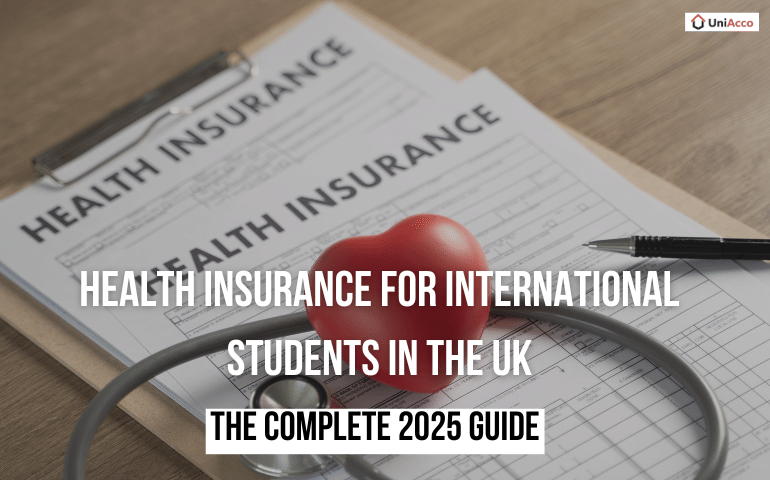Moving to the UK for your studies is exciting, but it can also be a bit overwhelming, especially when it comes to looking after your health. The UK healthcare system is famous for being accessible and comprehensive, but it’s not always easy to figure out how it works, especially if you’re new to the country. This guide is here to help you, as a student, get to grips with the United Kingdom’s national health service and everything you need to know to stay healthy during your time here.
What is the UK Healthcare System?
The United Kingdom healthcare system is built around the National Health Service (NHS), which is widely regarded as a national gem. The NHS was set up in 1948 with a simple aim: to make sure everyone in the UK can get medical help when needed, without worrying about the cost. That means most national health services are free at the point of use, whether you’re seeing a doctor, getting emergency care, or picking up a prescription.
But it’s not just about hospitals and doctors. The UK’s healthcare system covers everything from mental health support and vaccinations to sexual health clinics and dental care. There are private healthcare options, too, but most students stick with the NHS because it’s reliable and affordable.
Also read: The importance of student health and wellness
UK Healthcare System: Pros & Cons
Like any system, the health care system in the UK has its strengths and weaknesses. Here’s a quick look at what students often notice:
| Pros | Cons |
| Universal access for all residents, including students | Waiting times can be long for non-urgent treatments |
| Most services are free at the point of use | Quality and access can vary between regions |
| Strong focus on prevention and early intervention | Some dental, optical, and prescription services require fees |
| Easy access to emergency care and NHS 111 advice service | Limited choice of doctors and hospitals compared to private |
| Digital services like online booking and telemedicine growing | Staff shortages can affect service availability |
Accessing and Receiving Healthcare in the UK
The NHS is the UK’s public healthcare system, offering a wide range of services for free or at low cost to international students who meet certain criteria. Here’s what you need to know to access the United Kingdom healthcare system as an international student:
1. Pay the Immigration Health Surcharge (IHS)
- When applying for your student visa (for courses over six months), you must pay the IHS which is currently £470 per year, this entitles you to NHS services just like a UK resident.
- The IHS is mandatory and must be paid upfront as part of your visa application.
2. Register with a GP (General Practitioner)
- After arriving in the UK, register with a GP near your university or accommodation as soon as possible.
- You’ll need your passport, visa or biometric residence permit, and a letter from your university confirming your student status.
- Once registered, you’ll receive an NHS number, which you’ll use to access NHS services.
3. Booking Appointments and Accessing Care
- For non-emergency health issues, book an appointment with your GP. Many offer online, phone, or in-person consultations.
- In an emergency, call 999 or go to the nearest Accident & Emergency (A&E) department.
- For urgent but non-life-threatening issues, call NHS 111 for advice.
4. Understanding What’s Free and What Isn’t
- Most NHS services are free for eligible international students: GP visits, hospital treatment, A&E, mental health support, sexual health, and Covid-19 care.
- Unless you qualify for exemptions, you’ll usually pay for prescriptions (about £9.65 per item in England), dental care, and eye care.
- In Scotland, Wales, and Northern Ireland, prescriptions are often free.
5. Covid-19 Care
- COVID-19 tests, treatment, and vaccinations are free for everyone in the UK, regardless of immigration status or IHS payment.
Also read: List Of 10 Best Healthcare Apps For Students In 2025
Benefits of NHS Support for Students
The United Kingdom’s National Health Service (NHS) offers international and domestic students a reliable, accessible, and mostly free healthcare system that supports both physical and mental well-being throughout their studies. Here are the key benefits students can expect from the UK healthcare system:
1. Comprehensive Healthcare Access
By paying the Immigration Health Surcharge (IHS) as part of your visa application, international students gain access to NHS services on the same basis as UK residents. This means you can visit a GP, receive hospital treatment, access emergency care, and benefit from mental health support without additional charges for most services.
2. Free or Low-Cost Primary Care
General Practitioner (GP) consultations, the first point of contact for most health concerns, are free under the NHS. This includes vaccinations, sexual health services, and specialist referrals if needed. Students can register with a GP near their university to ensure quick and easy access to care.
3. Emergency and Urgent Care
The NHS provides 24/7 emergency services through Accident & Emergency (A&E) departments and the NHS 111 helpline, which offers urgent medical advice. This ensures students can get help whenever they need it, whether for serious injuries or urgent but non-life-threatening issues.
4. Mental Health Support
Recognising the pressures students face, the NHS offers a range of mental health services including counselling, therapy, and crisis helplines. Many universities also collaborate with the NHS to provide on-campus mental health resources, helping students manage stress and emotional well-being effectively.
5. COVID-19 Testing and Vaccination
All students, regardless of immigration status or visa conditions, can access free COVID-19 testing, treatment, and vaccination through the NHS. This inclusive approach helps maintain community health and student safety.
6. Reduced Cost for Prescriptions, Dental, and Optical Care
While most NHS services are free, some treatments like prescriptions, dental care, and eye tests may require a fee. However, students often qualify for reduced costs or exemptions, especially those under 19 or in full-time education.
7. Peace of Mind and Financial Protection
Access to the NHS means students are protected from potentially high medical costs abroad. The IHS fee (currently £470 per year for students) is a cost-effective way to ensure comprehensive healthcare coverage without the need for expensive private insurance
Core Points Regarding The UK Health Insurance
For international students, understanding how the UK healthcare system works and what kind of health insurance coverage you need is essential to ensure your well-being throughout your studies.
Here are the key points every student should know about health insurance and NHS access in the UK:
1. National Health Service (NHS) Coverage for Students
If you’re an international student planning to study in the UK for more than six months, you are generally eligible for free healthcare through the NHS. To access these services, you must pay the Immigration Health Surcharge (IHS) as part of your visa application. This fee, currently £470 per year, grants you access to NHS services on the same basis as UK residents, covering GP visits, hospital treatment, emergency care, and mental health support.
2. Registering with a General Practitioner (GP)
Once you arrive, registering with a local GP is crucial. Your GP is your first point of contact for most health issues and will provide referrals to specialists if needed. Registration usually involves visiting a GP surgery near your university or accommodation and completing a simple form. You’ll need to provide proof of identity and address, such as your passport, visa, and student ID or university letter.
3. European Health Insurance Card (EHIC) or Global Health Insurance Card (GHIC)
If you’re from the EU, EEA, or Switzerland, you may be eligible for an EHIC or GHIC card. This card allows you to access healthcare services at reduced cost or free when travelling within the European Union. However, since Brexit, the GHIC has replaced the EHIC for many, so check your eligibility and coverage carefully.
4. Understanding What the NHS Covers
Knowing what is included in NHS coverage and what might require additional payment or private insurance is essential. NHS services generally cover:
- GP consultations and referrals
- Hospital treatment and emergency care
- Maternity and contraceptive services
- Mental health support
However, some services like prescriptions, dental care, and eye tests may require a fee, which varies by region.
5. Considering Additional Private Health Insurance
While the NHS covers most medical needs, some students choose to purchase private health insurance for extra benefits, such as:
- Faster access to specialists and treatments
- More choice in healthcare providers and hospitals
- Coverage for services not fully covered by the NHS (e.g., some dental or optical care)
- Protection for pre-existing conditions or treatments abroad
Private insurance benefits short-term students (less than six months) who are not eligible for full NHS access or those wanting extra peace of mind.
Understanding the UK healthcare system is essential for students to stay healthy and focused during their studies. With the NHS providing comprehensive, mostly free healthcare and clear steps to access services, you can confidently manage your wellbeing in the UK. Pairing this knowledge with a comfortable, convenient living space makes all the difference in enjoying your student journey.
Discover UniAcco’s wide range of safe, affordable, and student-friendly accommodations, being close to campus and the nearest NHS centre – making the study-abroad journey a healthy and memorable experience.
Also read: The Importance of Student Health and Wellness
FAQs
1. What services does the NHS cover for international students in the UK?
The NHS covers GP visits, hospital treatment, emergency care, mental health support, sexual health services, and Covid-19 testing and vaccination. Some services like prescriptions, dental, and eye care may require a fee or partial payment.
2. Should international students get extra health insurance in addition to NHS coverage?
Most international students do not need private health insurance if they are studying for more than six months and paying the Immigration Health Surcharge (IHS). However, private insurance can be useful for faster specialist access or coverage of services not fully covered by the NHS.
3. Is it compulsory for international students holding a UK Student Visa to have health insurance?
Yes, international students must pay the Immigration Health Surcharge (IHS) as part of their visa application, which grants NHS access. This acts as mandatory health insurance for the duration of their studies.
4. Are international students able to access NHS services right after arriving in the UK?
Once students pay the IHS and register with a local GP, they can access NHS services. Registration with a GP should be done as soon as possible after arrival to ensure smooth access to healthcare.
5. What’s the best way for students to choose an appropriate health insurance plan in the UK?
Students should first confirm their NHS eligibility via the IHS. For additional coverage, compare private insurance plans based on cost, coverage limits, and services included, considering any pre-existing conditions or specific healthcare needs.















0 Comments